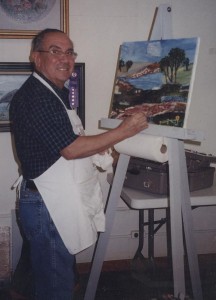 Cancer is cruel, and it seems we all know too many people who face the disease. My dear colleague and friend Amy Berman has been eloquently writing about her own experience, and it feels so unfair. But when I heard my father was diagnosed with prostate cancer several years ago, I actually recall feeling relief. I knew this cancer was typically more manageable and less deadly than most. Still, the “C-word” was devastating to hear, and it pains me to think of the worry and dread it caused my father, mother, and sisters. Dad completed radiation treatment five years ago, before I began working at the Hartford Foundation. Fortunately, for these past five years the cancer appeared to be gone. Unfortunately, appearances can be deceiving—the cancer is back.
Cancer is cruel, and it seems we all know too many people who face the disease. My dear colleague and friend Amy Berman has been eloquently writing about her own experience, and it feels so unfair. But when I heard my father was diagnosed with prostate cancer several years ago, I actually recall feeling relief. I knew this cancer was typically more manageable and less deadly than most. Still, the “C-word” was devastating to hear, and it pains me to think of the worry and dread it caused my father, mother, and sisters. Dad completed radiation treatment five years ago, before I began working at the Hartford Foundation. Fortunately, for these past five years the cancer appeared to be gone. Unfortunately, appearances can be deceiving—the cancer is back.
The work of the Foundation to improve the health of older adults can be very personal. Several of my colleagues have written about older adults in their lives—mothers, fathers, uncles, and neighbors. They have illustrated the real-world need for dramatic improvements in the training of health professionals and the design of our health care system so that our loved ones can be safe and get the quality care they deserve. Luckily, my father has been receiving excellent care, and so far, we haven’t encountered any of the problems I now know can be so prevalent. So far.
I’ve learned so much during my time with Hartford that it’s hard not to be worried. Are my father’s physicians looking only at his prostate, or are they looking at him as a whole person, considering his individual goals and desired outcomes when offering treatment options? Are they knowledgeable enough about his other chronic conditions and how they interplay with his cancer and treatment? If he undergoes the surgery they are recommending to remove his prostate, will he be discharged understanding his medication regimen? Will he know what follow-up he needs with his primary care and specialist providers, what red flags to look for, and whom to call if he has problems? Will his care be coordinated afterward? Or will he needlessly have to return to the hospital and be placed in unnecessary danger? (See Dr. Eric Coleman’s Care Transitions Program for one proven interdisciplinary method of reducing the likelihood of an unnecessary hospital readmission.)
Fortunately, my father is in the relatively “young” stage of getting older. He’s not in the 20 percent of Medicare beneficiaries with five or more chronic conditions. He doesn’t need assistance in what are known as Activities of Daily Living. He doesn’t have cognitive impairment. If he did, I now understand that his treatment considerations would be very different. I would make sure his providers had read an article written by Hartford-funded grantees William Dale, Supriya Mohile, and their colleagues called “Individualized Decision-making for Older Men with Prostate Cancer,” which calls for providers to perform Comprehensive Geriatric Assessments, move beyond looking at chronological age as a definitive guide for action, and consider the patient’s life expectancy and goals in order to prevent both over- and under-aggressive treatment. This is the value that geriatrics can bring to a specialty like oncology, and we need more of it. Two of our projects are working to make that happen, in the surgical specialties and the specialties of internal medicine.
Five years ago, I would have been floundering on Google for information to help my father. Now I look to our Foundation’s Facebook page and friends to find resources like the Dale/Mohile paper. But most people trying to care for an older family member aren’t as fortunate as I am to work here. It is incumbent on our health care providers to understand the value that specialized training in geriatrics and geriatric models of care bring. As my father ages and deals with his recurrence of the dreaded “C-word,” I want all his physicians to practice using the best science possible, and that means looking to geriatric medicine and the people and projects the Hartford Foundation funds.
